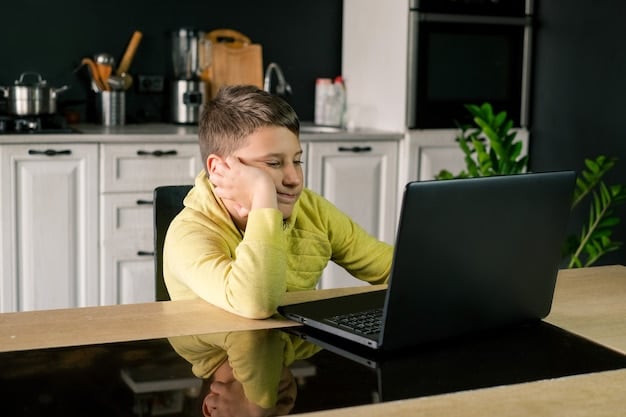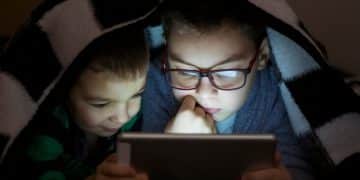Is Screen Time Robbing Your Child of Sleep? Tips for Parents

Excessive screen time can significantly reduce a child’s sleep duration, potentially costing them up to two hours of crucial rest each night, impacting their health and development.
Is your child struggling to fall asleep or waking up frequently during the night? The culprit might be hiding in plain sight: their screens. The digital age has brought endless entertainment and educational opportunities, but is your child’s screen time stealing 2 hours of sleep each night? Let’s explore the impact of screen time on children’s sleep and how parents can intervene.
Understanding the Sleep-Screen Time Connection
The connection between screen time and sleep is complex. It’s not just about the quantity of screen time, but also the timing and type of content consumed. Understanding these nuances is crucial for addressing potential sleep disruptions.
Firstly, let’s consider the effect of screen time before bed. Electronics emit blue light, which can interfere with the body’s natural production of melatonin, the hormone that regulates sleep. This can make it harder for children to fall asleep and disrupt their sleep cycle once they do drift off.
Blue Light and Melatonin
Blue light emitted from screens mimics daylight, signaling to the brain to stay awake. This disrupts the natural sleep-wake cycle, making it harder for children to fall asleep. Consistent exposure can shift the body’s internal clock, leading to chronic sleep issues.
The Psychological Impact
Beyond blue light, the content children consume can also impact their sleep. Engaging in stimulating activities like video games or social media can increase alertness and anxiety, making it harder to wind down before bed. Moreover, exposure to violent or disturbing content can lead to nightmares and restlessness.
- Creating a screen-free hour before bedtime allows the body to naturally produce melatonin.
- Encouraging relaxation techniques, like reading a physical book or listening to calming music, can help children unwind.
- Regulating the type of content children consume, particularly before bed, can minimize sleep disturbances.
In conclusion, understanding the connection between screen time and sleep is the first step in creating a healthier sleep environment for children. By addressing both the physiological and psychological impacts of screen time, parents can help their children get the restful sleep they need.

How Much Sleep Are Children Really Losing?
Determining exactly how much sleep children lose due to screen time can be challenging, as individual responses vary. However, research suggests that excessive screen time can significantly reduce sleep duration. Understanding the extent of this loss is crucial for parents seeking to promote better sleep habits.
Studies have shown that children who spend more time on screens tend to sleep less. One study found that for every hour of screen time, children lost an average of 15 to 20 minutes of sleep. When combined with the effects of blue light and stimulating content, this loss can accumulate significantly.
Quantifying Sleep Loss
Extensive research indicates screen time can reduce a child’s sleep by up to two hours. This deficiency can have significant repercussions for their physical and mental health.
Long-Term Effects
Consistent sleep deprivation caused by screen time can lead to multiple health problems for children, including depression. Ensuring children receive adequate sleep is critical to their overall well-being.
- Tracking screen time usage can provide valuable insights into potential sleep loss.
- Creating consistent bedtime routines, free from screens, can help regulate sleep patterns.
- Consulting with pediatricians or sleep specialists can offer personalized guidance and address individual needs.
In summary, the impact of screen time on children’s sleep can be substantial, potentially costing them valuable hours of rest each night. By quantifying this loss and taking proactive steps to reduce screen time, parents can help their children achieve healthier sleep patterns and improve their overall well-being.
Recognizing the Signs of Screen-Related Sleep Deprivation
It’s essential for parents to recognize signs of sleep deprivation that may be related to excessive screen time. Early detection allows for prompt intervention and can prevent long-term sleep problems.
One of the most evident signs is difficulty falling asleep. If a child consistently takes a long time to drift off after going to bed, it may signal that their sleep cycle is disrupted by screen time. Additionally, frequent awakenings during the night and difficulty waking up in the morning are common indicators.
Common Symptoms
Symptoms of insufficient sleep include irritability, decreased attention span, difficulty concentrating, and restlessness. Spotting these signs quickly can help mitigate ongoing sleep difficulties.
Linking Back to Devices
If symptoms occur alongside heavy use of phones, tablets, or computers, parents should think critically about how these technological devices might be the culprit behind troubled sleep.

These symptoms can be more readily identified if a parent is able to take a closer look at their child’s behaviors. This may require a candid conversation, or even a momentary monitoring with the child’s permission.
In conclusion, recognizing the signs of screen-related sleep deprivation is crucial for addressing sleep problems early on. By being observant and proactive, parents can help their children establish healthier sleep habits and improve their overall quality of life.
Establishing Healthy Screen Time Habits
Establishing healthy screen time habits is essential for minimizing the negative impact on children’s sleep. Setting clear limits and creating a balanced approach to screen usage can promote better sleep patterns and overall well-being.
One of the most effective strategies is to set time limits for screen usage. Determine realistic and age-appropriate limits, and consistently enforce these rules. Encourage alternative activities, such as outdoor play, reading, or creative hobbies, to fill the time previously spent on screens.
Setting Boundaries
Parents should work with a child’s routine to create reasonable screen time boundaries that can be integrated with a number of other routines and activities.
Consistency is Key
Following through with screen time limits and other guidelines is important for a child’s development. Being consistent can help ensure greater success throughout all routines.
- Implementing a screen-free hour before bedtime can significantly improve sleep quality.
- Encouraging alternative activities, such as reading or playing board games, can help children unwind before bed.
- Creating a family media plan can promote healthy screen time habits and open communication about screen usage.
By addressing both time and content, parents can help their children develop healthier relationships with technology and prioritize their sleep.
Creating a Bedtime Routine Conducive to Sleep
A consistent and relaxing bedtime routine can significantly improve children’s sleep quality. Creating a calming environment and establishing predictable rituals can help children wind down and prepare for sleep.
Start by establishing a consistent bedtime and wake-up time, even on weekends. This helps regulate the body’s natural sleep-wake cycle and promotes predictable sleep patterns. Create a relaxing bedtime environment by dimming the lights, reducing noise, and ensuring the room is at a comfortable temperature.
Elements of a Good Routine
Reading physical books, setting the temperature, dimming lights, and other actions can get the child ready for a full night of sleep.
Maintaining Consistency
Bedtime routines are most effective when they are consistent from day to day. Even during vacations, a proper routine can work wonders for sleep quality and quantity.
If a child resists a bedtime routine, consider how it might be made more appealing to them. Some children appreciate reading, while others would rather talk about their day so they can relieve the stress of the day.
In summary, creating a bedtime routine conducive to sleep involves establishing consistent bedtimes, creating a relaxing environment, and incorporating calming activities. By implementing these strategies, parents can help their children achieve restful sleep and improve their overall health and well-being.
Seeking Professional Help When Needed
Recognizing when to seek professional help for sleep problems is essential for addressing underlying issues and promoting long-term sleep health. If sleep disturbances persist despite implementing healthy screen time habits and bedtime routines, it may be time to consult with a healthcare professional.
Consulting a pediatrician is a good first step. They can assess the child’s overall health, rule out any underlying medical conditions that may be contributing to sleep problems. If necessary, the pediatrician may refer the child to a sleep specialist for further evaluation and treatment.
When To Consider it?
Some sleep problems are complex and will benefit from the guidance of an expert. This can help determine the source of the issue and provide treatment options.
Treating the Cause
Identifying the reason for the sleep difficulties with greater accuracy increases a parent’s ability to bring about meaningful relief for ongoing troubles.
- Documenting sleep patterns and behaviors can provide valuable information for healthcare professionals.
- Being open and honest about screen time habits and other lifestyle factors can aid in accurate diagnosis and treatment.
- Following the recommendations of healthcare professionals and consistently implementing treatment plans can lead to significant improvements in sleep quality.
By addressing underlying issues and implementing appropriate treatment plans, parents can help their children achieve restful sleep and improve their overall quality of life.
| Key Point | Brief Description |
|---|---|
| 📱 Screen Time & Sleep | Excessive screen use, especially before bed, disrupts sleep patterns in children. |
| 😴 Blue Light Effects | Blue light from screens interferes with melatonin production, delaying sleepiness. |
| ⚠️ Sleep Loss Signs | Irritability, difficulty concentrating, and trouble falling asleep may indicate sleep loss. |
| ⏰ Bedtime Routines | Consistent sleep schedules and relaxing activities promote better sleep for children. |
[Frequently Asked Questions]
Blue light emitted from screens can inhibit melatonin production, a hormone that regulates sleep. This disruption can make it harder for your child to fall asleep and stay asleep through the night, leading to reduced sleep duration.
Instead of screen time, try reading a physical book, listening to calming music, doing a simple puzzle, or engaging in a quiet conversation. These activities help relax the mind and prepare the body for sleep.
Set a consistent bedtime and wake-up time, even on weekends. Include calming activities like a warm bath, reading, or gentle stretching. Make sure the bedroom is dark, quiet, and at a comfortable temperature to promote sleep.
Signs of sleep deprivation include irritability, difficulty concentrating, hyperactivity, mood swings, frequent yawning, and difficulty waking up in the morning. If you notice these signs, it’s important to assess your child’s sleep habits.
If sleep disturbances persist despite implementing healthy screen time habits, or if you suspect an underlying medical condition, consult a pediatrician or sleep specialist. They can provide further evaluation and personalized treatment recommendations.
Conclusion
In conclusion, screen time can indeed steal precious hours of sleep from children, impacting their well-being and development. By understanding the risks, recognizing the signs, and implementing healthy screen time habits and bedtime routines, parents can help their children achieve restful sleep and thrive in the digital age.





